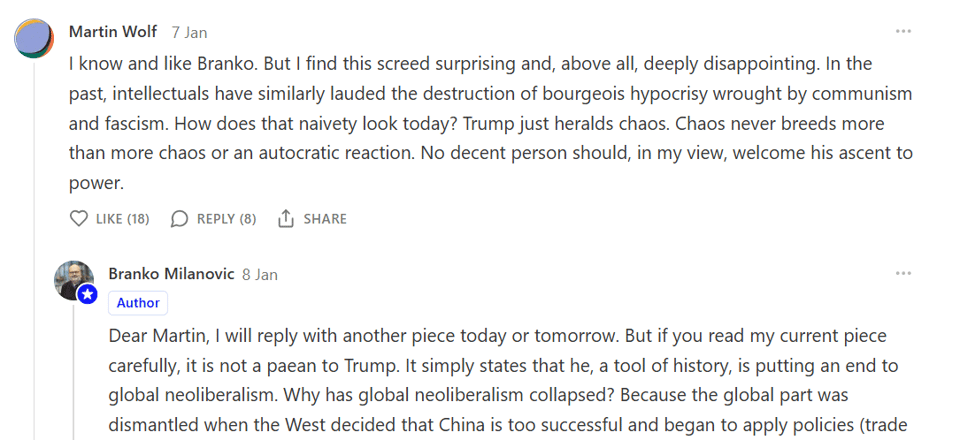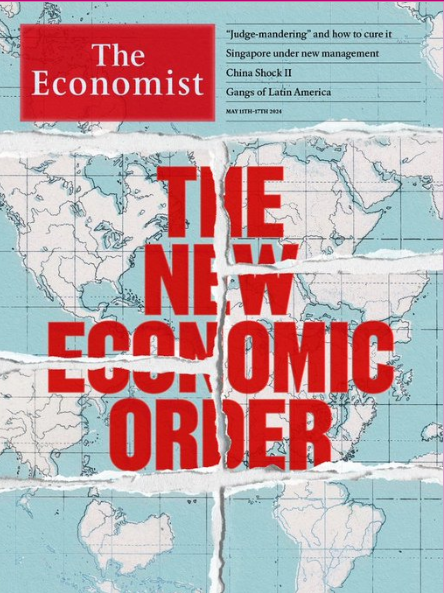Capitulation
Hello and welcome to our 28th Dispatch, and the first for 2025.
In a few days the world will change and we will be flooded with increasingly dismaying news out of the US. We’ll write more in future about the rest of the world deals with this era. Here, though, we’re looking at what the (not exactly new) context of America first, deglobalizing, post-neoliberalism means for international climate action, which was born at the high noon of neoliberal globalization. Now as that order is mutating, so is climate.
- Kate
CAPITULATION
Branko Milanovic wrote earlier this month that Trump is not so much a break with the past, as the conclusion of the dismantling of most of neoliberal globalization. January 20, he says, will only be a symbolic end to global neoliberalism. “Both of its components are gone. Globalism had now been converted into nationalism, neoliberalism has been made to apply to the economic sphere only.”

He points out – similarly to the essay Lara and I wrote in December – that measures like financial sanctions (friendshoring, export bans, and tariffs) have been expanded or were introduced during the Biden years, and in some cases much earlier (the WTO being undermined by Obama’s administration, for example).
The particular target of Milanovic’s ire, however, is the supposedly globalization-friendly mainstream economists and outlets like the Financial Times that he says have cheered this end with their openly suspicious response to China’s rise, and by framing China as a technology thief, even though tech transfer as a necessary part of development. If the champions of neoliberal globalization have already abandoned it, then the inauguration on Monday is only the symbolic turning point.
The end of neoliberal, globalised consensus has big implications for everything, including how climate change is tackled (or not). It’s particularly challenging because climate action grew up in the heyday of free markets, free trade, and the end of history.

The UN climate framework emerged in 1989, its early years evolving within the post-Berlin Wall consensus that globalized, democratic capitalism was the inevitable state of the world.
But international climate action had been growing up already in the high noon of neoliberalism. The seeds were sown in the 1970s and 1980s, with the OECD and the Bruntland Commission advancing ideas of economically-rational environmental action as a way to overcome the environment-versus-economy dichotomy. (The old strategy of using free market orthodoxy to combat the same orthodoxy.)
As political scientist Steve Bernstein wrote:
By 1992, a shift in norms of environmental governance had occurred, characterized by a general acceptance of liberalization in trade and finance as consistent with, and even necessary for, international environmental protection. These norms also promoted market and other economic mechanisms (tradeable pollution permits, privatization of the commons, and so on) over command and control methods (standards, bans, and quotas) as the preferred method of environmental management.
You can read more of that in my 2021 PW essay. Despite being a multilateral forum, the UNFCCC has granted “non-state actors” - private entities and provinces - a kind of semi-official status. That proved useful during the first Trump administration, as a way to highlight the continuing commitment of many US states and corporations.
Will neoliberalism’s decline undermine the process of international wrangling that is iterated each year by negotiators for 190+ countries at the Conference of the Parties? And more importantly, does it diminish the likelihood of cutting emissions fast enough to avoid the more catastrophic levels of warming? (Modelling on the canonical Shared Socioeconomic Pathways for IPCC reports suggests that a future of “regional rivalry” will make it impossible to get to the lowest emissions outcomes.)
Unlikely. In fact it’s gone against the US-China animosity; the China-US joint statement on emissions in 2014 was an essential prelude to the Paris Agreement.
But we’d argue that the determinants - and indicators - of emissions cuts have diffused into multiple arenas beyond clear-cut emissions reductions targets, especially since 2020.
Debt and trade are examples of this. In the 2023 COP28 recognised the need for concessional and grant-based finance and was the setting for commitments by multilateral banks to extend catastrophe clauses in their loans. In the 2024 COP just held in Azerbaijan, trade-related climate measures were given a formal space for the first time.
These examples are not simply a case of the climate diplomacy framework striving for relevance by seeking to incorporate other channels into its own program. Climate change, and responses to it, are now quite obviously part of the big shifts happening in the world today.
The material basis of the global production and information systems are being remade. One doesn’t have to be a Marxist to think that will imply a transformation in global politics. Green tech is a large component of the trade wars and the current neo-mercantilist rush for domestic manufacturing. Or, in the case of developing countries – for development. EVs are now a source of trade tensions between several great power blocs, with critical minerals driving contracts and diplomatic efforts. Energy security is top of mind for most countries. AI fads and data centres are a threat to decarbonization, while also driving breakthroughs in optical computing that will use far less power.
And climate impacts are driving inflation in all kinds of direct and indirect ways – from food to insurance premiums – which will stoke more inequity and discontent if not addressed.
***
Thanks for reading! There are some truly excellent links below. But first: We are reviewing our plans for this newsletter and we would really, genuinely, appreciate your feedback. The “open rate” is good; but we have to recognise the trade-off between these shorter dispatches versus the longer PW essay-style newsletters. Email Kate and/or Tim - please! - if you have thoughts.
Links:
Bookmark this: Advait Arun’s tour de force on the limitations of private capital for global infrastructure development.
Tooze wrote recently on the polycrisis, capitalism and the moment.
An Oxfam report argues that it is not so much geopolitical tensions as extreme inequality, the global ultrarich, and corporate power that are impeding action on poverty and climate. (Oxfam)
A proposal for increasing economic security with minimal fragmentation. (NBER)
A Wood Mackenzie industry-commissioned report on the US as the only country outside of China building a full solar supply chain.
Two questions: What is Europe going to do about Musk (Guardian)? What is Europe going to do about Trump? (Financial Times)
Isabella Weber’s patient and clear refrain that new policy tools are needed to tackle inflation in these times of overlapping crises has some very recent examples in Spain and Mexico. (Foreign Affairs)
This is really the end, now!
Add a comment: